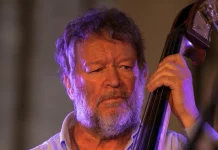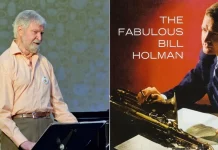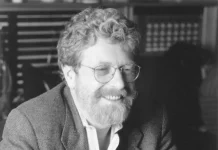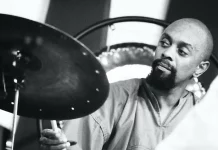
Arranger, composer and saxophonist Jimmy [James Edward] Heath was born in Philadelphia in 1926, and died in Louisville, Georgia on 25 October. His father, a labourer, played clarinet in the local Elks Club band, while his mother, Arlethia sang in their local church choir.
Originally an alto saxophonist, Heath earned the nickname of “Little Bird” because of his devotion to Charlie Parker as well as his own short stature (5′ 3″). A playful wordsmith, Heath called his autobiography (published in 2010), I Walked With Giants. After gigging in Philadelphia (and playing with Benny Golson and John Coltrane), at the age of 22, together with his bassist brother Percy, he moved to New York in 1947 to join trumpeter Howard McGhee’s band. Jimmy also played in Dizzy Gillespie’s big band and sextet, and Diz became his mentor. He then took up the tenor saxophone and quickly developed a warm, commanding and distinctive voice.
A promising career as an instrumentalist was interrupted by a prison sentence (1955-59) for drug offences following the break-down of his first marriage, but he used this confinement to develop his skills as an arranger, composer and leader of the penitentiary’s big band. His scores were sometimes smuggled out by his brother Tootie on prison visits, and appeared on several jazz albums. He also kicked his heroin habit.
You become an icon when you’re dead. I always say I’d rather be an acorn, and be alive
After his release in 1960, he was not allowed to tour outside Philadelphia, but managed to record a remarkable album for Riverside – humorously titled Really Big! – on which he played some booting tenor, backed by such distinguished sidemen as brothers Percy (bass), who achieved lasting fame with the MJQ, and “Albert Tootie” Heath (drums), Clark Terry, the Adderley brothers, and either Tommy Flanagan or Cedar Walton. It remains one of his finest achievements.
In other recordings he demonstrated an ability to extract big band sounds and dynamics from relatively small combos. He later began playing with Art Farmer, and in 1975 formed his own group, the Heath Brothers. They released several excellent albums, including Marchin’ On (1975), which included his Smiling Billy Suite, dedicated to drummer Billy Higgins, and Passin’ Thru (1978). But most of Heath’s energies were increasingly devoted to writing. In his autobiography he remembers: “It was a time of transition in the jazz world. I was trying to evolve and create music that was acceptable to the generation of the 60s and 70s. In fact, I’ve been told by certain people that they started listening to jazz as a result of what the Heath Brothers were recording”.
In 1980 the Heath Brothers album Live At The Public Theatre (Columbia) was nominated for a Grammy award. Many of his compositions – Ginger Bread Boy, When Sonny Gets Blue, For Minors Only, Picture Of Heath and CTA – became jazz standards, and several were performed by Chet Baker and Art Pepper on their 1956 LP Playboys. Because of its appropriation of a well-known “men only” magazine, it was confusingly re-released as Picture Of Heath. An album with the same title featuring Heath with Barry Harris, Sam Jones and Billy Higgins appeared on the Xanadu label in 1975. The same year he completed his Afro-American Suite Of Evolution, written for a 30-piece orchestra, and performed at New York Town Hall. The New York Times critic John S. Wilson commended it as “an illustrative survey for which Mr. Heath showed his versatility by composing segments that caught the spirit of the various periods”.
A genuinely modest man, Jimmy was aware that he had not achieved the fame of some of his jazz contemporaries. Interviewed by Valerie Wilmer for her book Jazz People, he said: “I‘m not the sort of person to go up to somebody and say ‘I would like to record for your record company’, and write up a whole brochure of all the things I’ve done for the past 25 years. I’ll never start making tapes to take along for people to hear me. If you come down and hear me play, you’ll find the reason why I haven’t been no overnight success”. Yet he later said that he had no regrets. In 2014 he told an interviewer: ”You become an icon when you’re dead. I always say I’d rather be an acorn, and be alive”.
Heath was also a pioneering jazz educator. In 1964 he helped found Jazzmobile, an organisation that gave performances (using a mobile stage) and classes to young people in Harlem, the Bronx and Brooklyn. In 1986 he helped to found a jazz studies programme at Queens College. As he also told Valerie Wilmer: “My advantage is in being a writer. When the jazz gigs don’t come through I can always sit at home and think up a tune to give to one of my friends who like my music. I’ve just written two new ones for Cannonball Adderley and Miles is always asking me to bring in some more music”.
In 1993 his Verve album Little Man, Big Band was also nominated for a Grammy. In the same year he jammed with President Bill Clinton at a White House jazz concert. Clinton, an aspiring tenor saxophonist, borrowed Jimmy’s instrument to play a blues. Helped by the donor, he found the right key, and as Heath later remembered: “He stumbled, but he landed on his feet”.
Jimmy Heath is survived by his second wife, Mona Brown, daughter Roslyn Heath-Cammorto, and son James Mtume, from his first marriage and seven great-grandchildren.















